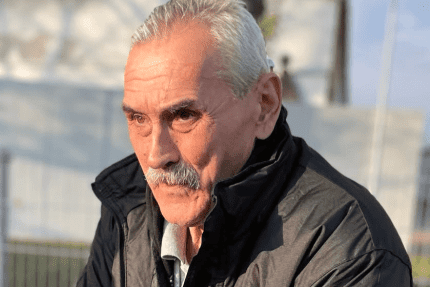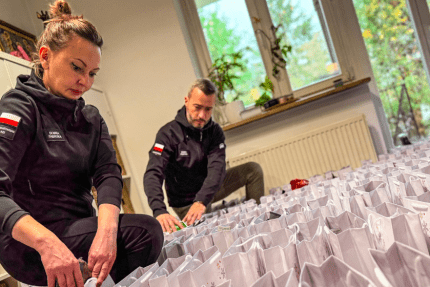Now, when we are facing a cold wave, the Good Factory Foundation encourages support for people in a homelessness crisis. How to wisely help those in crisis? Is it worth doing it on your own?
It is estimated that there are about 30,000 homeless people in Poland, with over 3,000 in Warsaw alone. Every year, more than 100 people die due to the cold. Many fundraising campaigns aimed at helping those in a homelessness crisis are organized during the holiday season. However, the cold has arrived in January, and help is needed now more than ever.
The biggest threat to people in a homelessness crisis is that they become invisible.
The Good Factory – which for several years has supported those in need by organizing fundraisers for so-called Warm Packages, containing sleeping bags, jackets, and shoes for the homeless – advises on how to help those staying in abandoned buildings and on the streets.
Is it worth helping on your own? How to react?
1. Don’t be afraid to help! How to respond to requests for cash from the homeless?
The form of help should always depend on the situation of the person in need. Cash is the easiest but not always the best way to help. Giving money to a homeless person, we can never be sure it will be used as we intend. All we can do is remind the recipient that from this moment, they are responsible for the money entrusted to them. The fear of “wasting” the donation should not stop us from acting.
If you’re unsure about how the money will be used, it’s always better to offer to buy a few things for the person in need.
2. To ensure your resources are well used, entrust them to professionals from charity organizations.
If you want your resources to be wisely used, entrust them to one of the organizations specializing in professional help for people in a homelessness crisis. Sharing a meal or cash, we must remember that it’s only temporary, emergency aid, which does not fully solve the problems that led to that person living on the street. Providing long-term and effective help to the homeless is a complex process, and there are organizations and institutions that specialize in it. It’s worth considering working with them if you want to help people not just once, but also support them in overcoming homelessness.
3. Don’t be indifferent, even despite hesitation – someone’s life may depend on your reaction.
In situations where people encountered outdoors or in unheated buildings face direct threats to their health and life due to cold weather, it is imperative to react. Those under the influence of alcohol are especially vulnerable to dangerous situations.
In such cases, it’s best to contact the city guard, police, or escort the homeless person to a safe place. Even if the person in need refuses help, but we know they are in danger, it’s necessary to notify the appropriate services.
4. How to help without causing harm?
To avoid causing harm, provide the kind of help that the person in need can accept. This is how organizations dealing with homelessness operate. If, however, the person refuses cooperation and the only thing we can do is provide immediate assistance, then it should be given. If the person in need is willing to undergo therapy, agrees to the rules of shelters, and is ready to take a step further to participate in a housing training program, appropriate organizations can provide such help.
Helping the homeless is not easy. Emerging from homelessness is a process, and those in crisis need time, understanding, and the help of specialists.
Simply giving a homeless person money or funding their housing is not enough to help them. The needs of people in a homelessness crisis are often complex, and the scale of help and the prospect of returning to normality can be overwhelming. Therefore, it is important to provide the person in need with the care of the appropriate specialists and ensure a gradual emergence from the crisis, as it is often a long and difficult process, for which not every homeless person is ready.
To implement permanent changes, it’s necessary to introduce training programs for people in a homelessness crisis, which can help them not only finance their most essential needs but also find their way in a new reality – with full material, social and psychological support



